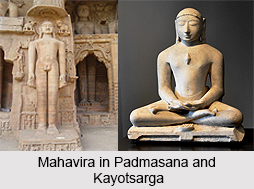 Jain sculptures were primarily notable for their splendour. The brilliance of the Jain sculptures can be seen from the fine images of the Jain Tirthankaras. Columned chambers, inner sanctums, domes and pointed spires are the common elements of the Jain Temples architecture.
Jain sculptures were primarily notable for their splendour. The brilliance of the Jain sculptures can be seen from the fine images of the Jain Tirthankaras. Columned chambers, inner sanctums, domes and pointed spires are the common elements of the Jain Temples architecture.Figurines of Jain Art
Jain sculptures are images of Jain Tirthankara. Jain sculptures are an example of Jain art. These figures, also known as "Tirthankaras" that are the principal focus of Jainism art. They are worshiped by followers of Jainism. The Tirthankara sculptures are mainly of Lord Parshvanatha, Rishabh Dev or Vardhaman. The highest ideal in Jainism is the wandering and passionless ascetic, which is why Jains are always depicted as mendicants or yogis. They are portrayed in only two positions: either seated in the lotus posture (Padmasana) or standing in the exclusively Jain body-abandonment posture (Kayotsarga).
In terms of style, ornament, subsidiary figures, Jain sculpture is indistinguishable from sculpture made for other Indian religious groups. Movements and innovations within the Jain religious communities are also depicted in sculpture, which proved influential to members of other religious traditions with which they regularly came in contact. Some features of Jain sculpture are Jain, unmistakable from imagery associated with other sects and they help one to identify the work as Jain in orientation. They include representations of the 24 Tirthankaras who are the liberated beings of Jainism. Narrative sequences that are found only in Jain devotional texts. Most common are scenes from the lives of the Tirthankaras especially Mahavira, Lord Parshwanatha or Rishavanatha.
Examples of Jain Sculptures
Giant rock-cut statues of Jain Tirthankaras are carved in the Gwalior Fort, Gwalior and Madhya Pradesh. Charans are footprints exclusive to Jain temples. The charans of Tirthankara Rishabha are present at the Badrinath Temple. Many Jain sculptures are kept in Government Museum, Chennai.
For more, check the link below: